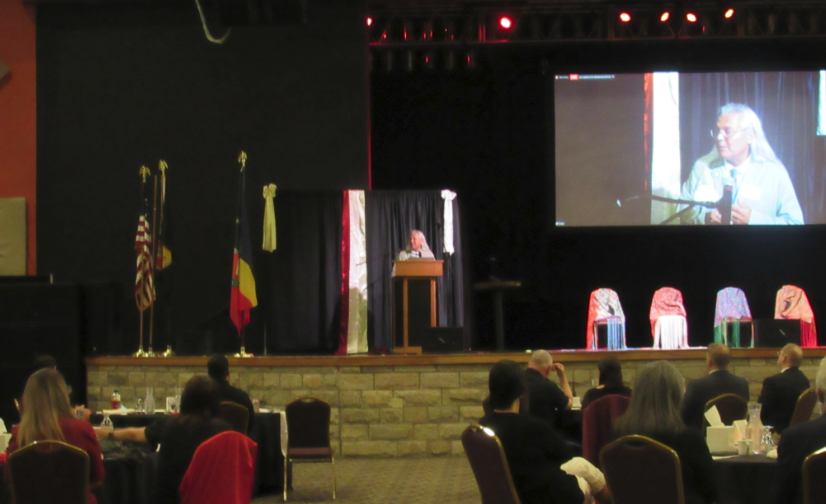
- Details
- By Levi Rickert
SAULT STE. MARIE, Mich. — As part of a U.S. Dept. of Justice pilot program, the Bay Mills Indian Community and Sault Ste. Marie Tribe of Chippewa released Murdered & Missing Indigenous Persons (MMIP) Tribal Community Response Plans on Tuesday at the Kewadin Casino’s Dream Makers Theater in Sault Ste. Marie, Mich.
In attendance were several dozen tribal, federal, state and local law enforcement leaders to hear the key components of the tribal community response plans.
Want more Native News? Get the free daily newsletter today.
The plans unveiled Tuesday were the final products of work that began late last October.
Tuesday morning’s program was emceed by Bay Mills Indian Community Chairperson Whitney Gravelle.
In her introductory remarks, Chairperson Gravelle provided an overview of the murdered and missing Indigenous persons crisis across Indian Country.
“Native women face rates of murder that are ten times higher than the national average, and murder is the third leading cause of death for Native women,” Chairperson Gravelle said. “Of these statistics, 40 percent of Native women victims are also victims of human sex trafficking, even though we only make up ten percent of the overall population in the United States.
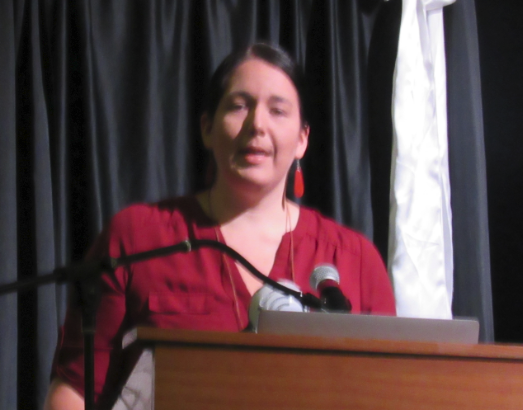
“To bring that into perspective, if you know a Native woman, or you know a Native woman and her family, you also know someone who has survived violence in their lifetime, whether it be domestic, physical, or sexual,” Gravelle said.
Included in the program were videos of U.S. Dept. of the Interior Secretary Deb Haaland, U.S. Sen. Gary Peters (D-MI), Michigan Gov. Gretchen Whitmer and Michigan Attorney General Dana Nessel. All of these government dignitaries echoed the theme on the importance of law enforcement agencies to work together in a coordinated effort.
Help our Indigenous-led newsroom create journalism that inspires, uplifts and informs Native Americans. Make a donation to Native News Online.
“The plans you have been discussing today will have an impact for generations to come and can help families find their loved ones, solve cases and prevent our people from going missing without a trace,” Interior Secretary Deb Haaland said in her video message. “Everyone deserves to feel safe in their communities, but the missing and murdered Indigenous peoples’ crisis is one that Native communities have had to face since the dawn of colonization. For too long, this issue has been swept under the rug with the lack of urgency, attention and funding.”
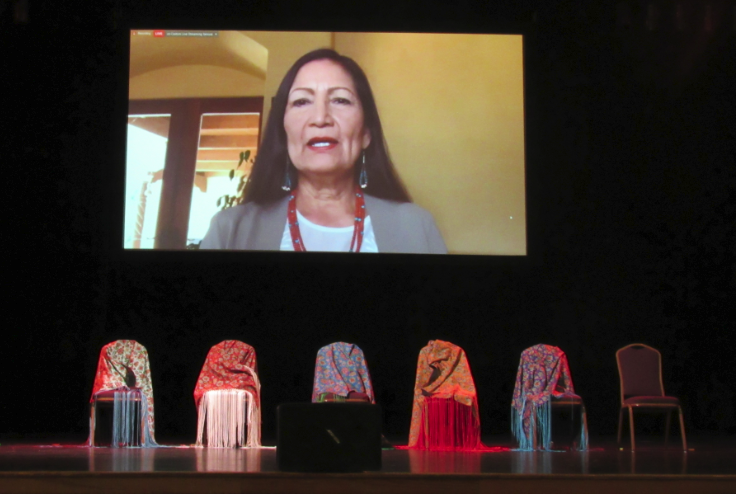
The intention of the tribal community response plans is to have tribes have in place the plan to improve the handling of emergent missing person cases by outlining how tribal governments, law enforcement, and other partners can best work together to respond to such cases.
“Our overarching purpose was to articulate a MMIP Tribal Community Response Plan. While there was a great volume of work done to draft our response plan, I see it as a beginning to hone our skills to prevent, rescue and recover our victims,” Sault Ste. Marie Tribal Chairperson Aaron Payment said. “Our Victims Services teams helped write the plan to ensure we are caring for victims and their families.”
The MMIP Tribal Community Response Plans consist of four main components that include law enforcement, victim service provider, public and media communications and community outreach.
The goal of the tribal response plans is to collectively utilize all available resources within a victim-centered, trauma-informed and cultural-honoring response between tribal government services, including law enforcement.
Both plans of the two tribes included language about sensitivity relating to missing and murdered Indigenous person cases.
U.S. Attorney by the U.S. District Court for the Western District of Michigan Andrew Birge said the plans developed by the two tribes will serve as a model for other tribal and non-tribal communities.
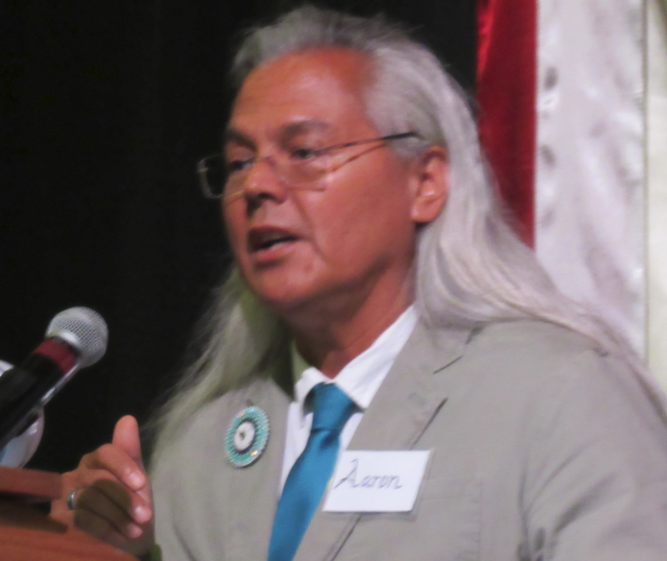
Michigan is among the first of six pilot-program states developing community response plans, in accordance with the U.S. Attorney General’s Missing and Murdered Indigenous Persons Initiative and the President’s Operation Lady Justice Task Force. Importantly, these plans likewise further the goals of the recent Savanna’s Act legislation. The other states are Oklahoma, Montana, Minnesota, Alaska and Oregon.
Tuesday’s unveiling coincided with a month-long awareness campaign about missing and murdered Indigenous persons. Across the street from the Kewadin Casino, the Advocacy Resource Center is hosting a REDress Campaign, a powerful public display, with red dresses hung to commemorate all “Missing Sisters” across Indian Country and to honor their memory.
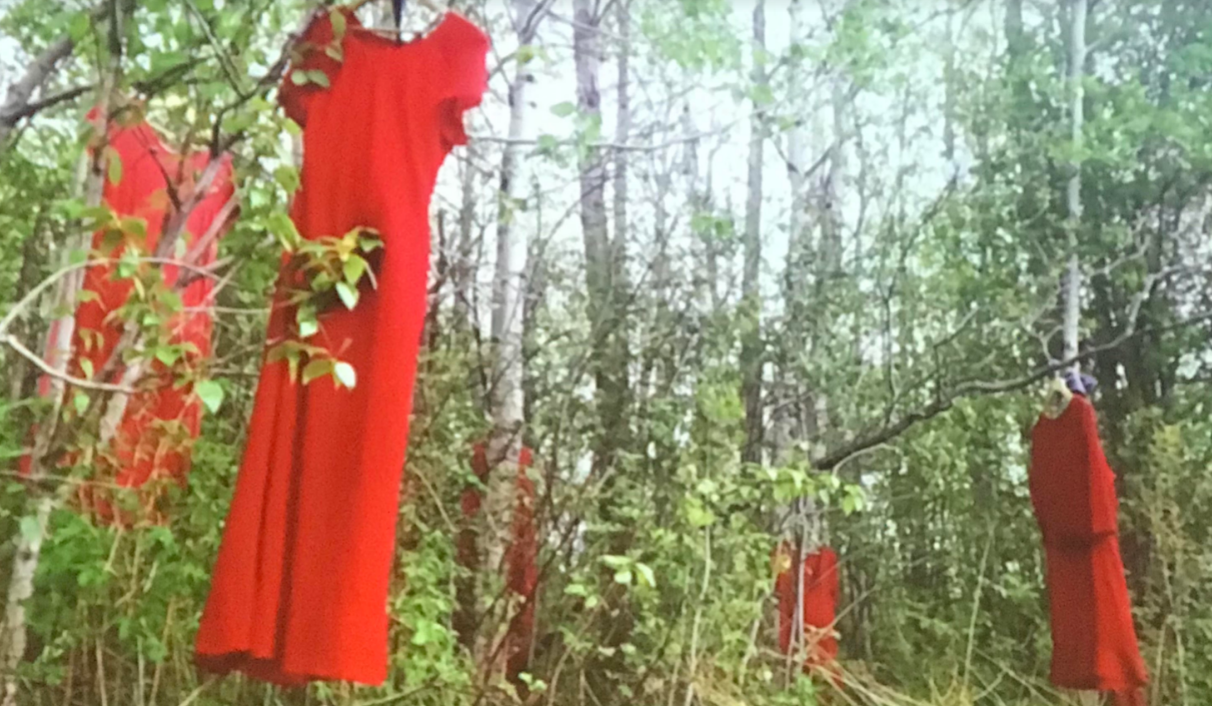
The REDress campaign originated in Canada by Jaime Black of the Metis aboriginal group.
More Stories Like This
Native News Weekly (August 25, 2024): D.C. BriefsScope Narrowed, Report Withheld: Questions Mount Over Michigan Boarding School Study
Zuni Youth Enrichment Project Announces Family Engagement Night and Spring Break Youth Programming
Next on Native Bidaské: Leonard Peltier Reflects on His First Year After Prison
Deb Haaland Rolls Out Affordability Agenda in Albuquerque
Help us defend tribal sovereignty.
At Native News Online, our mission is rooted in telling the stories that strengthen sovereignty and uplift Indigenous voices — not just at year’s end, but every single day.
Because of your generosity last year, we were able to keep our reporters on the ground in tribal communities, at national gatherings and in the halls of Congress — covering the issues that matter most to Indian Country: sovereignty, culture, education, health and economic opportunity.
That support sustained us through a tough year in 2025. Now, as we look to the year ahead, we need your help right now to ensure warrior journalism remains strong — reporting that defends tribal sovereignty, amplifies Native truth, and holds power accountable.
 The stakes couldn't be higher. Your support keeps Native voices heard, Native stories told and Native sovereignty defended.
The stakes couldn't be higher. Your support keeps Native voices heard, Native stories told and Native sovereignty defended.
Stand with Warrior Journalism today.
Levi Rickert (Potawatomi), Editor & Publisher

